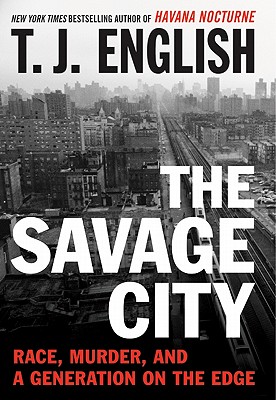
 Two events frame this hard-hitting history of a decade that boosters of New York City would rather forget: the brutal killings of Janice Wylie and Emily Hoffert on August 28, 1963 (later dubbed by the tabloid press as "The Career Girls Murders"), and the December 1972 release of the final report of the Knapp Commission on police corruption in New York City. "From the time of the Career Girls Murders, the city had descended into a kind of urban madness; a tidal wave of injustice and insurrection, ambushes and assassinations, led some to believe that the city could not be saved," writes T.J. English (Harlem Nocturne), and he illustrates his claims of racism and police corruption through the experiences of George Whitmore, Dhoruba Bin Wahad and Bill Phillips.
Two events frame this hard-hitting history of a decade that boosters of New York City would rather forget: the brutal killings of Janice Wylie and Emily Hoffert on August 28, 1963 (later dubbed by the tabloid press as "The Career Girls Murders"), and the December 1972 release of the final report of the Knapp Commission on police corruption in New York City. "From the time of the Career Girls Murders, the city had descended into a kind of urban madness; a tidal wave of injustice and insurrection, ambushes and assassinations, led some to believe that the city could not be saved," writes T.J. English (Harlem Nocturne), and he illustrates his claims of racism and police corruption through the experiences of George Whitmore, Dhoruba Bin Wahad and Bill Phillips.
Whitmore, a hapless, nearly blind teenager, started a casual conversation with a Brooklyn patrolman on an April day in 1964; before he knew it, he was typed by the police as "a wayward Negro boy you could pin crimes on and no one would ever know or care." He assumed that if he gave the police what they wanted, they'd let him leave the precinct house without further ado. He was instead charged with two crimes he did not commit; when Manhattan Detective Edward Bulger arrived on the scene, Whitmore was also charged with the naggingly unsolved Career Girls Murders. He was on the fast track to the electric chair--and he was innocent. Eventually, after the real killer was caught and confessed, "the entire system of criminal justice was implicated in the railroading of George Whitmore."
If George Whitmore was naive, respectful and passive in his encounters with law enforcement, Dhoruba Bin Wahad was his opposite number. Radicalized by the writings of Malcolm X and Eldridge Cleaver, he joined the Black Panthers and rose to become a highly visible symbol of the fight for black liberation and an end to police brutality. English spares no detail showing how dangerous and violent that fight became during the same years when Mayor Lindsay was proclaiming New York "Fun City."
Bill Phillips was, in contrast, a respected career officer with the New York Police Department. He did his job, looked good to casual observers and collected graft so efficiently that he was a role model for crooked cops. Being on the take led accidently to entrapment in a wiretap sting; Phillips then worked undercover for the Knapp Commission and sang the tune that "the NYPD's habit of physical abuse went hand in hand with its pattern of financial corruption." The system exacted its toll on Phillips, too--framed for homicide in (alleged) retaliation for the role he played in the Knapp Commission, he spent 33 years in prison.--John McFarland
Shelf Talker: A devastating, hard-hitting story of racism, violence and police corruption in New York City during the years when the metropolis wanted to be known as "Fun City."

